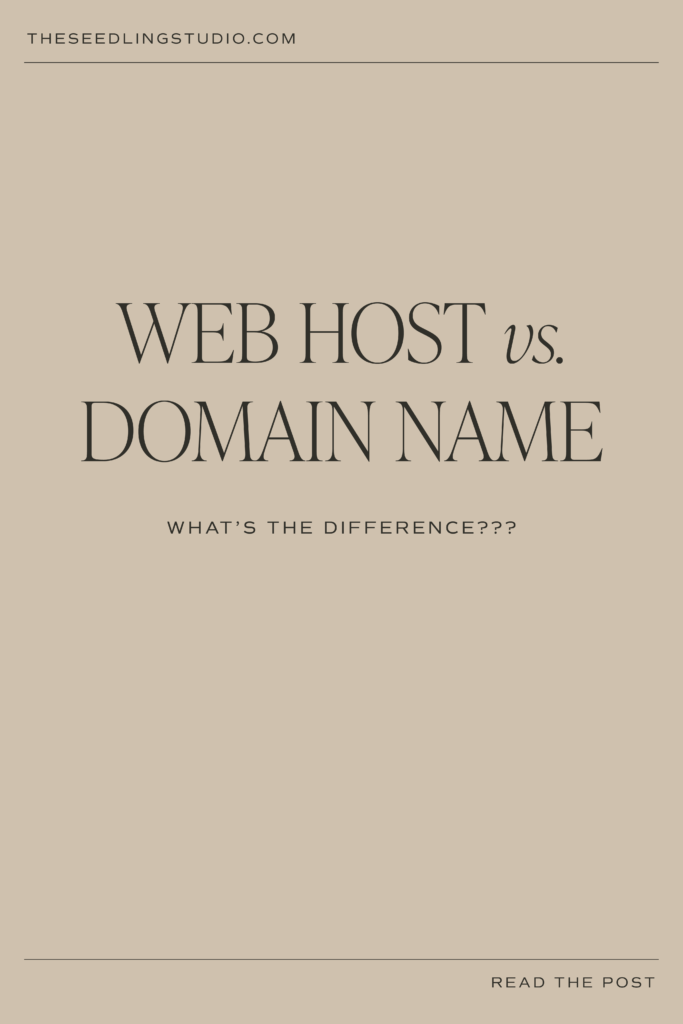As someone who creates websites for a living, one of the most common points of confusion I see people run into is the difference between a web host vs. domain name.
If you’re confused about this, you’re not alone! Website hosting and domain names don’t exactly fall into the category of common knowledge.
But as a business owner, you need to understand these pieces of the website puzzle! That way, you’ll be able to make smart decisions when it comes to spending money on your website. You’ll also have a better grasp on how everything fits together, so you’ll know exactly where to turn if you run into any issues.
Disclaimer: We are proud affiliates for some of the products mentioned in this post. If you make a purchase after clicking on these links, we’ll receive a commission at no extra cost to you. We only recommend tools we’ve tried, tested, and loved.

Web Host vs. Domain Name: Important Differences You NEED to Understand
For your website to work, you need both a domain name and a website host. But what are they, and how do they work together?
To understand the differences between a web host vs. domain name, you first need to understand what each of these terms means.
What is a Web Host?
The easiest way to explain website hosting is to think of your website as a house. When you’re building a house, what’s the first thing you need? A plot of land to build it on!
That’s exactly what your web host provides. When you pay a company to host your website, you’re paying for real space on that company’s web servers.
So, just like the plot of land your house is built on, your web host is the space where all of your website’s data is stored.
Depending on the size and specifications of your digital “house,” you’ll need a different amount of server resources. Just as larger plots of land are more expensive, so are larger hosting plans.
This is why most hosting providers offer different plan levels. Hosting tiers are typically based on how much storage space you need (the size of your website) as well as how much traffic your website receives.
What is a Domain Name?
Continuing with our house analogy, your domain name is like your house’s address. Just like when someone types your home address into Google Maps, users will type your domain name (or URL) into their internet browser to visit your website.
Your domain name has to be unique – no one else can have the same address as you. This way, your internet browser knows exactly where to take you when you type in your website’s URL.
Without a domain name, nobody would be able to find your website! It would be as if your house didn’t have an address – it would still exist, but it would be much more difficult for people to find.
Do You Need a Domain Name and a Web Host?
To have a working website, you need both a domain name and a web host.
Many website-building platforms, like Squarespace, Showit, and Shopify, host your website for you. This means the monthly or annual fee you pay to use their website platforms includes the “plot of land” where your website lives.
Some platforms even allow you to purchase a domain name directly from them, so all the parts of your website are taken care of in one place.
If you choose to use WordPress (as many of our clients do), you’ll typically need to purchase these items separately.
How to Buy a Domain Name
First off, check to see if the website platform you’re using allows you to bundle your domain name with your subscription. If you’re using Squarespace, this option is available to you!
In most other cases, you’ll need to buy a domain name from a third-party domain provider. Our recommendation for where to purchase a domain name is Google Domains.
Google’s interface is extremely user-friendly and easy to navigate. And, unlike other popular domain registrars (ahem, GoDaddy), they won’t try to upsell you on a bunch of bogus services you don’t need.
Getting a domain name is easy! Simply search for a domain name that matches your brand. The cost of your domain name will vary depending on the commonality of the words it contains.
Don’t get discouraged if your domain name is already taken – get creative with different arrangements and endings. For example, if the .com version of your domain name is taken, see if another ending like .co or .net is available.
Do your best to keep it relatively short, branded, and easy to spell!
Which Hosting Provider Should You Use?
When it comes to choosing a hosting provider, there’s no shortage of options. Some of the most important features to look for in a web host are speed, customer service, and cost.
For most of our clients, we typically recommend hosting websites with SiteGround. They offer affordable introductory pricing, have excellent customer service, and make your website fast and secure.
We host our website on WPEngine. It is a bit more expensive than SiteGround, but it offers the best speed, security, and customer service on the market.
The cheaper hosting option is not always better! Many hosting companies (including BlueHost and HostGator) are owned by the same hosting conglomerate, EIG. In our experience, the hosting service on all of these servers is sub-par and slow. So, while you’ll find a ton of BlueHost affiliates pushing their cheap rates online, our advice is to steer clear of them!
Now, you have a good understanding of the differences between a web host vs. domain name! Be sure to share this post with your entrepreneur friends so we can help make this information common knowledge.
Want more help DIY-ing your website? Download our FREE Website Launch Checklist so you don’t miss a single step.




